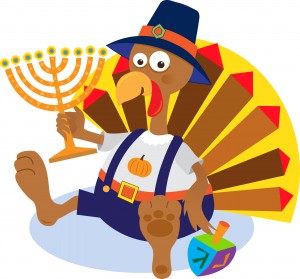 Eli Lansey is planning on deep-frying brussel sprouts, stuffing his turkey with latkes and baking cranberry sufganiyot.
Eli Lansey is planning on deep-frying brussel sprouts, stuffing his turkey with latkes and baking cranberry sufganiyot.
Yes, Thanksgivukkah, the once-in-a-great-while confluence of the first day of Chanukah and Thanksgiving, is upon us. Lansey, a physicist and graduate of Yeshiva University, was the first to point out the rare meeting of the two holidays way back in 2010 using a computer formula. (It probably wasn’t too difficult for Lansey; the title of his dissertation for his Ph.D. in physics was, “Aperture Array Photonic Metamaterials: Theoretical approaches, numerical techniques and a novel application.”)
Thanksgivukkah, as it’s been dubbed by bloggers, comedians and pundits alike, occurred only once before, in 1888, since Thanksgiving was established in 1863. Though other days of Chanukah and Thanksgiving have overlapped twice before, in 1899 and 1918. The first night of Chanukah (not the first day) will coincide with Thanksgiving in 2070 and 2165. However, expect a long wait until the next Thanksgivukkah, which will occur in the year 79811 C.E.
Lansey isn’t the only one planning a special menu for the holiday. The website Buzzfeed posted some of the more interesting recipes, including pecan pie rugelach, pumpkin latkes and what appears to be a relatively inedible purple Manischewitz-soaked turkey (To be fair, Manischewitz also put out this great rap video about it.) Even Macy’s is getting into the spirit with a dreidel float in this year’s Thanksgiving Day Parade.
However, unlike the more common confluence of Christmas and Chanukah, these two holidays are more natural bedfellows, explained Rabbi Steven Weil, executive vice president of the Orthodox Union.
“Chanukah is about Hallel and hoda’a, expressing our gratitude for Hashem saving Judaism,” said Rabbi Weil. “It’s expressing our profound gratitude for the survival of our religion. In a way, there is a parallel for a Jew on Chanukah and an American on Thanksgiving.”
Jonathan Sarna, a professor of Jewish Studies at Brandeis University and the author of the authoritative, “American Judaism,” said that linking Jewish holidays to American ones has been a feature of Jewish American life.
“I think American Jews are always happy when they can link being Jewish to being American. Those connections are always satisfying,” he said. “We’re least happy when there are contradictions between being Americans and being Jewish.”
He also added that the holiday has an unexpected perk: it makes getting together for Chanukah parties that much easier since everyone has the day off.
Diane Ashton, whose book, “Hanukkah in America,” was published by NYU Press in October, said that the first Jewish magazine in America, The American Hebrew, took a similar approach to the two holidays in 1888.
“They remarked on the fact that Chanukah is a type of thanksgiving,” she said. “American Jews have long been quite successful in linking American ideas to Judaism and showing that there is really a lot of correspondence between American values and Jewish values.
The holiday has also spawned its very own marketing bonanza, including the Menurkey, a turkey-shaped menorah, peddled by a 9-year-old and his internet-savvy father, not to mention online retailers selling T-shirts, mugs and sweatshirts, to name some of the Thanksgivukkah products. One online retailer was even brazen enough to attempt to trademark the holiday name.
We reached out to George Jochnowitz, an emeritus linguistics professor at CUNY’s College of Staten Island, who said he didn’t have any problems with the name of the holiday though he stressed an older pronunciation of the holiday.
“Since the traditional Yiddish pronunciation is Khanike (Hanikkah), I think I would prefer Thanksgivikkah, which also sounds closer to Thanksgiving,” he wrote. “However, Khanike has gone out of style except among Hasidic communities, so I guess Thanksgivukkah is OK.”
Though as for Menurkey or Turkeyorah, he was less sanguine.
“One neither eats a menorah nor places candles in a turkey,” he said. “What would be the point of combining the words?
Rabbi Dr. Tzvi Hersh Weinreb, executive vice president, emeritus of the Orthodox Union, offered some thoughts to keep in mind while celebrating.
“Jews living in these United States have much to be thankful for,” Rabbi Weinreb said. “As Jews, we are thankful for the blessings which God has bestowed upon us throughout our history as well as in the present —bayamim haheim ba’zman hazeh. As citizens of the United States we are thankful for all of the benefits of democracy with which we are blessed. This year we will be able to thank the Almighty for all of these blessings, as devout Jews and as patriotic Americans, on the very same day.”
In other words: Gobble Tov!
This article reflects a correction to the date of the next convergence of Chanukah and Thanksgiving. It is in 57 years, on Nov. 27, 2070, rather than 79,000 years from now, as has been widely reported.
The words of this author reflect his/her own opinions and do not necessarily represent the official position of the Orthodox Union.
